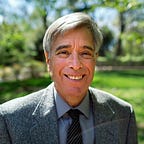Obesity’s Silent Role in Covid-19 Deaths
The untold story of the coronavirus pandemic is obesity’s impact on the death toll. The casket calamity would not have been nearly as bad had the United States not been victimized by obesity levels three times or more higher than other Western, developed nations. The body weight problem has bedeviled the U.S. for a long, long time. As a nation we have done nothing about it, particularly its destructive march through Black and Hispanic populations who have disproportionately higher rates of obesity and Covid-19 deaths than Whites.
There is no arguing obesity’s significant multiplier effect on Covid-19 deaths. A study presented at the American Heart Association’s virtual scientific sessions last November found patients with severe obesity — those with a body mass index (BMI) of 40 or greater — had slightly more than double the risk of being put on a ventilator and a 26% higher risk of death compared to normal-weight patients. Interestingly, the mortality association was strongest in younger adults: patients age 50 and younger with severe obesity had a 36% higher risk of death compared to their normal-weight peers.
More than 42 percent of U.S. adults have obesity, according to the Centers for Disease Control and Prevention (CDC) which does not have comparison data for other countries. That data can be found at https://ourworldindata.org/. There one finds statistics on deaths per 100,000 population for countries around the world. The U.S. is near the top of the world with 71.97 deaths per 100,000 in 2017, the latest year that statistics are apparently available. Statistics for other countries are from 2016. They are: France 21.6, Brazil 22.1, Australia 29, Russia 23.1 and China 6.2.
In fact, the U.S. numbers are going in the wrong direction. The 2019 CDC Adult Obesity Prevalence Maps show that obesity remains high — twelve states now have an adult obesity prevalence at or above 35 percent: Alabama, Arkansas, Indiana, Kansas, Kentucky, Louisiana, Michigan, Mississippi, Oklahoma, South Carolina, Tennessee, and West Virginia. That was up from nine states in 2018.
Given the attention to disproportionate deaths of Blacks during Covid-19 and the role obesity has played in amping those death numbers, it is particularly relevant to note 34 states and the District of Columbia had an obesity prevalence of 35 percent or higher among non-Hispanic Black adults. Country wide, non-Hispanic Black adults had the highest prevalence of self-reported obesity (39.8%), followed by Hispanic adults (33.8%) and non-Hispanic White adults (29.9%).
There really has been no American effort to address obesity. The last time the Surgeon General of the United States issued a report on obesity was in 2001. It was called Call To Action To Prevent and Decrease Overweight and Obesity and it stated that obesity in the U.S. was “an epidemic.” Obviously that call to action fell on deaf ears. The Department of Health and Human Services (HHS) has issued reports and recommendations on obesity prevention — task force recommendations were issued as recently as 2019 — but any evidence of their effectiveness would be hard to find. According to National Geographic in 2019, the average American eats nearly 30 pounds of french fries each year.
Nor, despite the intense focus on health care in Congress during the past year, the one bill on obesity, which was introduced with significant bipartisan support, a victory in these partisan Congresses in and of itself, disappeared from view immediately after introduction. That was Treat and Reduce Obesity Act. That bill has been introduced in every session of Congress since 2013. With the same result. Moreover, all that bill would do would allow registered nurses to provide intensive behavioral therapy for obesity and have Medicare reimburse for that service. Talk about papering over a problem.
But the lack of legislative movement is perhaps not surprising. There is an American Cancer Society. There is an American Heart Association. They have a major presence in Washington and their high-priced policy and legislative shops push well-developed policies. They were leading voices in what has been a very successful war against smoking, for example. There is an American Obesity Association. Its bare website lists no staff of any kind. There is an Obesity Action Coalition (OAC) which does list a staff. But it has no presence in Washington, or even a legislative staffer. The OAC does have a Washington lobbyist listed for it, Potomac Currents, whose lobbying report for 2020 lists no dollars spent for that client.
Maybe another federal grant program is not what is needed anyway. What would have made — and would make — a difference would have been for Deborah Birx or Tony Fauci last year and Fauci now, with their almost daily appearances on TV, to have underlined the link between obesity and Covid-19 deaths and encouraged better choices; the same as they encouraged distancing and mask wearing. A lot of weight could have been lost in the last year. But the word “obesity” never left their lips. It is not too late. President Biden and his Covid-19 task force can lead the charge. Will they? Or are they silenced by PC concerns about “fat shaming” to the point of allowing so many more innocent deaths and serious health issues beyond Covid-19?
Others too can have a positive impact, including in the Black community. What about someone like LeBron James? Wouldn’t a public service campaign built around him make a difference, particularly among Blacks? Maybe players in the National Basketball Association should wear uniforms with the message “Obesity Matters” on their backs?
As a country we were clearly unprepared for the Covid-19 pandemic. But in our silence on obesity over the decades we laid the groundwork for a significant portion of its deaths. Let us be prepared for the next health pandemic — and for fewer deaths from heart disease and cancer — by being proactive on physical fitness and good eating habits.
